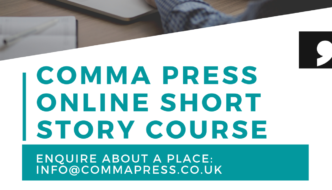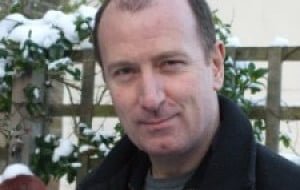
Image: C.D. Rose, Comma Press
With a short story course kicking off in February and its own short story collection – The Book of Birmingham (Comma Press) – out in June, it feels like Birmingham’s literary heyday is upon us. TSOTA spoke to the writer hoping to guide a new cohort of writers in the form about the wonders and diversity of both the city and the short story.
TSOTA: You have a grounding in various forms – from short stories to what I think has been termed ‘satirical reference novels’. What’s special for you about the short story?
CDR: For me what’s special about the short story is that, despite its apparent restrictions, it’s an incredibly flexible form; it can be anything, from something approaching a journalistic article, an essay, a diary entry… It can be an anecdote, a fairytale, a joke, or a perfectly artistically wrought piece of verbal art. The other thing that’s special is the short story’s relationship to time – the way it can compress time into a very short space for the reader, yet at the same time – paradoxically, or incredibly – open it up. A good short story can stay with you in ways that novels or films often can’t. It can get into your soul.
TSOTA: What can the writers who attend the course learn from practising the short story?
CDR: I think it’s important to say writing a short story isn’t training for writing a novel. Obviously there are skills and techniques that cross over, but writing a short stories is quite a different discipline to writing a novel, or a poem. So that’s the aim of the course, to train people and to help people write really good short stories. It’ll cover things like awareness of editing skills, creating characters, creating structures, lexical choices, prose, syntax, very specific technical choices, as well as thinking about the role the function of stories and storytelling in the world we live in.
TSOTA: Can you give us three short stories that you think are the pinnacle of short story writing?
CDR: Oh God, that is such a hard question… Angela Carter is one of the best practitioners of the form, and there’s one particular story, The Four River Axe Murders, which is in this odd genre of the historical short story – which isn’t a big one, but this story is amazing. It’s set in the 1890s. Now the interesting thing is that she originally thought it was going to be a novel, and she went to New England to research it, and spent about two or three years writing this thing as a novel, before realising she could write this thing in four or five pages. So it ended up becoming a short story. It’s so rich and so dense; there’s so much in it.
Another one would be James Joyce’s The Dead, one of the canonical stories. It’s a portrait of a society, and it all takes part place in one night, in one moment, but at the same time it stretches out to the universal. And then to have something really contemporary, there’s a book I read last year by Eley Williams called Attrib., and there’s a story called Smote. It’s about someone looking at a painting and wanting to kiss the person they are with. And it’s just such a playful and passionate and poignant thing. Really intensely emotional, but also very funny and playful, in just a few short pages.
TSOTA: You say people don’t need to have any practical experience of writing short stories before doing the course. From your experience teaching creative writing, what kind of differences do you see in people who come to your session already well-practised and those who come to it with a blank page?
CDR: It has a lot to do with life experience. Particularly younger students who did BAs in creative writing can be very good in lots of ways – they know about structure and plot and all that. But often people who come in from other angles or who haven’t really practised or studied writing before tend to have such different experiences, attitudes and ideas, and can bring so much more to a group. Different tastes and understandings about what stories are, where they come from and what they should do.
TSOTA: I once heard an author say that she never directly mines her life experiences for inspiration. How do you navigate that as a writer? Do you go around life looking out for stories, or do you do think that’s problematic?
CDR: It is problematic. I used to say that I never put any of myself in my stories, that I keep myself absolutely absent. And now, looking back, I realise I was being a bit ingenuous, because even though you think you’re not putting things in, and even though I probably wouldn’t write anything like an autobiographical story, there’s always some element of something I’ve seen – some memory, your way of imagining things, your observations do sneak into the story. Everything, once it’s written, becomes filtered through or processed through the lens of my experience. It was a slow realisation that I was never just a camera, not just a recording machine – even though I might try to be.
TSOTA: Why do you think Birmingham inspires stories?
CDR: It’s a city that I’m discovering is passionately cared about by the people that live here. There’s a great sense of place here. There’s great care and pride of place, often in specific localities. Like the difference between Birmingham and the Black Country, people are very proud of being from the Black Country, or North Birmingham, or South Birmingham. It has obviously a rich tradition of immigration and ethnic diversity. And then just odd pockets, little things like the canals, these little charms and corners… They’re probably where the stories come from.
TSOTA: What’s the difference between constructive criticism and criticism?
CDR: I think the clue is in the title. Constructive criticism is pointing you forward to things that can be achieved. It can be about specific technical choices or suggestions, but I think it’s also about encouraging writers to develop their own, what I call, ‘personal poetics’ – knowledge of how you work, why you work, what your own personal rules for writing are. If you can develop that, then that’s your touchstone, something you can go back to to help you generate more work in the future. Sometimes the difficult thing about being a tutor is that you see someone’s got a really good idea, and you want to tell them to do it how you would do it yourself. But you can’t do that. You can’t tell somebody how to write a story. You can only help them to find the best way for them of telling the story.
TSOTA: What kind of reaction do you want your stories to evoke in the reader?
CDR: That’s a good question. I would love to say wonder.
C.D. Rose and Comma Press’s six-week short story course starts on 1 February 2018 in The Custard Factory’s Orwell Suite. £180 full price/£100 concessions. For more information and bookings, visit Comma’s website.
Filed under: Written & Spoken Word
Tagged with: Birmingham, C.D. Rose, Comma Press, Creative Writing, literature, short story, short story course



Comments